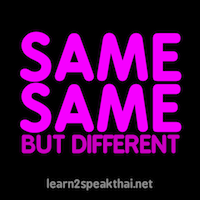
I’m sure you’ve heard Thai people say “same same ” or a popular Germany film called “Same same but different “.
When it’s come to Thai grammar and Thai way of like thing are quite not the same.
Like, in Thai greeting “wâi” some might think “I know how to wai , you put your hands together” Well, partly true but not that easy.
Check out how to greet like a Thai here and listen to Thai greeting podcast here
Similar
คล้าย/ kláai/ to resemble ; similar ; alike
Variation
1.คล้าย/ kláai
2.คล้ายกับ/ kláai gàp
3.คล้ายกันกับ/ kláai gan gàp
4.คล้ายคล้ายกับ/ kláai kláai gàp
All mean “similar”
Pattern
| noun,noun phase | 1.คล้าย/ kláai | noun,noun phase |
| noun,noun phase | 2.คล้ายกับ/ kláai gàp | noun,noun phase |
| noun,noun phase | 3.คล้ายกันกับ/ kláai gan gàp | noun,noun phase |
| noun,noun phase | 4.คล้ายคล้ายกับ/ kláai kláai gàp | noun,noun phase |
Example
1.ภาษาไทยคล้ายภาษาลาว
pa-să Thai kláai pa-să Lao.2.ภาษาไทยคล้ายกับภาษาลาว
pa-să Thai kláai gàp pa-să Lao.
3.ภาษาไทยคล้ายกันกับภาษาลาว
pa-să Thai kláai gan gàp pa-să Lao.
4.ภาษาไทยคล้ายคล้ายกับภาษาลาว
pa-să Thai kláai kláai gàp pa-să Lao.
Thai language is similar to Lao language.
Note: Thai and Lao language are just similar but the same.
Note
-คล้ายกับ/ kláai gàp
is not the same as
-คล้ายกัน/ kláai gan
คล้ายกับ/ kláai gàp+ noun,noun phase.
คล้ายกัน/ kláai gan is use at the end of sentence.
Example
1. ภาษาไทยคล้ายกับภาษาลาว
pa-să Thai kláai gàp pa-să Lao.
Thai language is similar to Lao language.
2.ภาษาไทยกับภาษาลาวคล้ายกัน
pa-să Thai gàp pa-să Lao คล้ายกัน
Thai language and Lao language are similar.
The same as/like
เหมือน/ mĕuan / like ; as ; the same
Variation
1.เหมือน/mĕuan
2.เหมือนกับ/ mĕuan gàp
3.เหมือนกันกับ/mĕuan gan gàp
4.เหมือนเหมือนกับ/mĕuan mĕuan gàp
All mean “like, as, the same ”
Pattern
| noun,noun phase | 1. เหมือน/mĕuan | noun,noun phase |
| noun,noun phase | 2.เหมือนกับ/ mĕuan gàp | noun,noun phase |
| noun,noun phase | 3.เหมือนกันกับ/mĕuan gan gàp | noun,noun phase |
| noun,noun phase | 4.เหมือนเหมือนกับ/mĕuan mĕuan gàp | noun,noun phase |
Example
1.บ้านคุณเหมือนบ้านผม
bâan kun mĕuan bâan pŏm
2.บ้านคุณเหมือนกับบ้านผม
bâan kun mĕuan gàp bâan pŏm
3. บ้านคุณเหมือนกันกับบ้านผม
bâan kun mĕuan gan gàp bâan pŏm
4. บ้านคุณเหมือนเหมือนกับบ้านผม
bâan kun mĕuan mĕuan gàp bâan pŏm
Your house is like/similar/as same as my house.
All 3 sentences have the same meaning.
Note
-เหมือนกับ/mĕuan gàp
is not the same as
-เหมือนกัน/mĕuan gan
เหมือนกับ/mĕuan gàp+ noun,noun phase.
เหมือนกัน/mĕuan gan is use at the end of sentence.
Example
1. บ้านคุณเหมือนกับบ้านผม
bâan kun mĕuan gàpbâan pŏm
Your house is like my house.
2. บ้านคุณกับบ้านผมเหมือนกัน
bâan kun gàp bâan pŏm mĕuan gan
Your house and my house are the same
เหมือน/ mĕuan / like ; as ; such as ; as if; same
VS
คล้าย/ kláai/ to resemble ; similar ; alike
“Things that are เหมือน/ mĕuan are more similar than if they’re คล้าย/ kláai”
(by Thai refference grammar )




 Thai Proverb
Thai Proverb
Very interesting post. I don’t understand when using เหนือน and using คล้าย ? is it “similar” usage หรือเบล่า ครับ
เหมือน means the same ,คล้าย means similar
“Things that are เหมือน/mĕuan are more similar than if they’re คล้าย/ kláai”
The patten of usage are the same as mentioned in the post ka
Am I answered your question ka?
OK, I have to use เหมือน when it is really exactly identical situations or things.
And use คล้าย when it just looks like ?
thats is absolutely correct ! ถูกต้องที่สุดค่ะ
ขอบคุณสำหรับบทเรียนนี้นะค่ะ
ไม่เคยได้ยินคำว่า คล้าย ค่ะ
เอโล
ยินดีและดีใจมากค่ะที่คุณชอบบทเรียน ลองใช้คำว่าคล้ายดูนะคะ
เช่น คุณเอโลหน้าคล้ายพ่อหรือแม่คะ ปกติลูกจะคล้ายพ่อแม่
more example of คล้าย/ kláai/similar, do you (look) similar you dad or mom ?
Normally, children look similar to their parents. This is why I use คล้าย/ kláai/similar since เหมือน/ mĕuan means alike.
Use คล้าย/ kláai/similar when it’s just similar, use เหมือน/ mĕuan alike when it’s nearly identical.
หน้าฉันคล้ายหน้าแม่ค่ะ
Now I have to be careful about the pronunciation between คล้าย (high tone) ไกล (middle tone) and ใกล้ (falling tone).